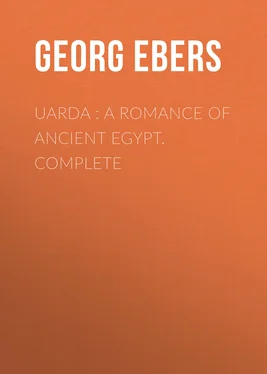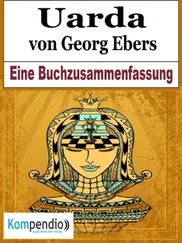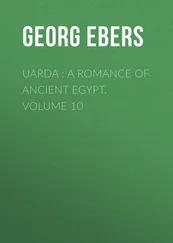Georg Ebers - Uarda - a Romance of Ancient Egypt. Complete
Здесь есть возможность читать онлайн «Georg Ebers - Uarda - a Romance of Ancient Egypt. Complete» — ознакомительный отрывок электронной книги совершенно бесплатно, а после прочтения отрывка купить полную версию. В некоторых случаях можно слушать аудио, скачать через торрент в формате fb2 и присутствует краткое содержание. Жанр: Альтернативная история, literature_19, foreign_antique, foreign_prose, Исторические приключения, на английском языке. Описание произведения, (предисловие) а так же отзывы посетителей доступны на портале библиотеки ЛибКат.
- Название:Uarda : a Romance of Ancient Egypt. Complete
- Автор:
- Жанр:
- Год:неизвестен
- ISBN:нет данных
- Рейтинг книги:4 / 5. Голосов: 1
-
Избранное:Добавить в избранное
- Отзывы:
-
Ваша оценка:
- 80
- 1
- 2
- 3
- 4
- 5
Uarda : a Romance of Ancient Egypt. Complete: краткое содержание, описание и аннотация
Предлагаем к чтению аннотацию, описание, краткое содержание или предисловие (зависит от того, что написал сам автор книги «Uarda : a Romance of Ancient Egypt. Complete»). Если вы не нашли необходимую информацию о книге — напишите в комментариях, мы постараемся отыскать её.
Uarda : a Romance of Ancient Egypt. Complete — читать онлайн ознакомительный отрывок
Ниже представлен текст книги, разбитый по страницам. Система сохранения места последней прочитанной страницы, позволяет с удобством читать онлайн бесплатно книгу «Uarda : a Romance of Ancient Egypt. Complete», без необходимости каждый раз заново искать на чём Вы остановились. Поставьте закладку, и сможете в любой момент перейти на страницу, на которой закончили чтение.
Интервал:
Закладка:
Georg Ebers
Uarda : a Romance of Ancient Egypt – Complete
CHAPTER I
By the walls of Thebes—the old city of a hundred gates—the Nile spreads to a broad river; the heights, which follow the stream on both sides, here take a more decided outline; solitary, almost cone-shaped peaks stand out sharply from the level background of the many-colored. limestone hills, on which no palm-tree flourishes and in which no humble desert-plant can strike root. Rocky crevasses and gorges cut more or less deeply into the mountain range, and up to its ridge extends the desert, destructive of all life, with sand and stones, with rocky cliffs and reef-like, desert hills.
Behind the eastern range the desert spreads to the Red Sea; behind the western it stretches without limit, into infinity. In the belief of the Egyptians beyond it lay the region of the dead.
Between these two ranges of hills, which serve as walls or ramparts to keep back the desert-sand, flows the fresh and bounteous Nile, bestowing blessing and abundance; at once the father and the cradle of millions of beings. On each shore spreads the wide plain of black and fruitful soil, and in the depths many-shaped creatures, in coats of mail or scales, swarm and find subsistence.
The lotos floats on the mirror of the waters, and among the papyrus reeds by the shore water-fowl innumerable build their nests. Between the river and the mountain-range lie fields, which after the seed-time are of a shining blue-green, and towards the time of harvest glow like gold. Near the brooks and water-wheels here and there stands a shady sycamore; and date-palms, carefully tended, group themselves in groves. The fruitful plain, watered and manured every year by the inundation, lies at the foot of the sandy desert-hills behind it, and stands out like a garden flower-bed from the gravel-path.
In the fourteenth century before Christ—for to so remote a date we must direct the thoughts of the reader—impassable limits had been set by the hand of man, in many places in Thebes, to the inroads of the water; high dykes of stone and embankments protected the streets and squares, the temples and the palaces, from the overflow.
Canals that could be tightly closed up led from the dykes to the land within, and smaller branch-cuttings to the gardens of Thebes.
On the right, the eastern bank of the Nile, rose the buildings of the far-famed residence of the Pharaohs. Close by the river stood the immense and gaudy Temples of the city of Amon; behind these and at a short distance from the Eastern hills—indeed at their very foot and partly even on the soil of the desert—were the palaces of the King and nobles, and the shady streets in which the high narrow houses of the citizens stood in close rows.
Life was gay and busy in the streets of the capital of the Pharaohs.
The western shore of the Nile showed a quite different scene. Here too there was no lack of stately buildings or thronging men; but while on the farther side of the river there was a compact mass of houses, and the citizens went cheerfully and openly about their day’s work, on this side there were solitary splendid structures, round which little houses and huts seemed to cling as children cling to the protection of a mother. And these buildings lay in detached groups.
Any one climbing the hill and looking down would form the notion that there lay below him a number of neighboring villages, each with its lordly manor house. Looking from the plain up to the precipice of the western hills, hundreds of closed portals could be seen, some solitary, others closely ranged in rows; a great number of them towards the foot of the slope, yet more half-way up, and a few at a considerable height.
And even more dissimilar were the slow-moving, solemn groups in the roadways on this side, and the cheerful, confused throng yonder. There, on the eastern shore, all were in eager pursuit of labor or recreation, stirred by pleasure or by grief, active in deed and speech; here, in the west, little was spoken, a spell seemed to check the footstep of the wanderer, a pale hand to sadden the bright glance of every eye, and to banish the smile from every lip.
And yet many a gaily-dressed bark stopped at the shore, there was no lack of minstrel bands, grand processions passed on to the western heights; but the Nile boats bore the dead, the songs sung here were songs of lamentation, and the processions consisted of mourners following the sarcophagus.
We are standing on the soil of the City of the Dead of Thebes.
Nevertheless even here nothing is wanting for return and revival, for to the Egyptian his dead died not. He closed his eyes, he bore him to the Necropolis, to the house of the embalmer, or Kolchytes, and then to the grave; but he knew that the souls of the departed lived on; that the justified absorbed into Osiris floated over the Heavens in the vessel of the Sun; that they appeared on earth in the form they choose to take upon them, and that they might exert influence on the current of the lives of the survivors. So he took care to give a worthy interment to his dead, above all to have the body embalmed so as to endure long: and had fixed times to bring fresh offerings for the dead of flesh and fowl, with drink-offerings and sweet-smelling essences, and vegetables and flowers.
Neither at the obsequies nor at the offerings might the ministers of the gods be absent, and the silent City of the Dead was regarded as a favored sanctuary in which to establish schools and dwellings for the learned.
So it came to pass that in the temples and on the site Of the Necropolis, large communities of priests dwelt together, and close to the extensive embalming houses lived numerous Kolchytes, who handed down the secrets of their art from father to son.
Besides these there were other manufactories and shops. In the former, sarcophagi of stone and of wood, linen bands for enveloping mummies, and amulets for decorating them, were made; in the latter, merchants kept spices and essences, flowers, fruits, vegetables and pastry for sale. Calves, gazelles, goats, geese and other fowl, were fed on enclosed meadow-plats, and the mourners betook themselves thither to select what they needed from among the beasts pronounced by the priests to be clean for sacrifice, and to have them sealed with the sacred seal. Many bought only part of a victim at the shambles—the poor could not even do this. They bought only colored cakes in the shape of beasts, which symbolically took the place of the calves and geese which their means were unable to procure. In the handsomest shops sat servants of the priests, who received forms written on rolls of papyrus which were filled up in the writing room of the temple with those sacred verses which the departed spirit must know and repeat to ward off the evil genius of the deep, to open the gate of the under world, and to be held righteous before Osiris and the forty-two assessors of the subterranean court of justice.
What took place within the temples was concealed from view, for each was surrounded by a high enclosing wall with lofty, carefully-closed portals, which were only opened when a chorus of priests came out to sing a pious hymn, in the morning to Horus the rising god, and in the evening to Tum the descending god.
[The course of the Sun was compared to that of the life of Man. He rose as the child Horns, grew by midday to the hero Ra, who conquered the Uraeus snake for his diadem, and by evening was an old Man, Tum. Light had been born of darkness, hence Tum was regarded as older than Horns and the other gods of light.]
As soon as the evening hymn of the priests was heard, the Necropolis was deserted, for the mourners and those who were visiting the graves were required by this time to return to their boats and to quit the City of the Dead. Crowds of men who had marched in the processions of the west bank hastened in disorder to the shore, driven on by the body of watchmen who took it in turns to do this duty and to protect the graves against robbers. The merchants closed their booths, the embalmers and workmen ended their day’s work and retired to their houses, the priests returned to the temples, and the inns were filled with guests, who had come hither on long pilgrimages from a distance, and who preferred passing the night in the vicinity of the dead whom they had come to visit, to going across to the bustling noisy city farther shore.
Читать дальшеИнтервал:
Закладка:
Похожие книги на «Uarda : a Romance of Ancient Egypt. Complete»
Представляем Вашему вниманию похожие книги на «Uarda : a Romance of Ancient Egypt. Complete» списком для выбора. Мы отобрали схожую по названию и смыслу литературу в надежде предоставить читателям больше вариантов отыскать новые, интересные, ещё непрочитанные произведения.
Обсуждение, отзывы о книге «Uarda : a Romance of Ancient Egypt. Complete» и просто собственные мнения читателей. Оставьте ваши комментарии, напишите, что Вы думаете о произведении, его смысле или главных героях. Укажите что конкретно понравилось, а что нет, и почему Вы так считаете.












